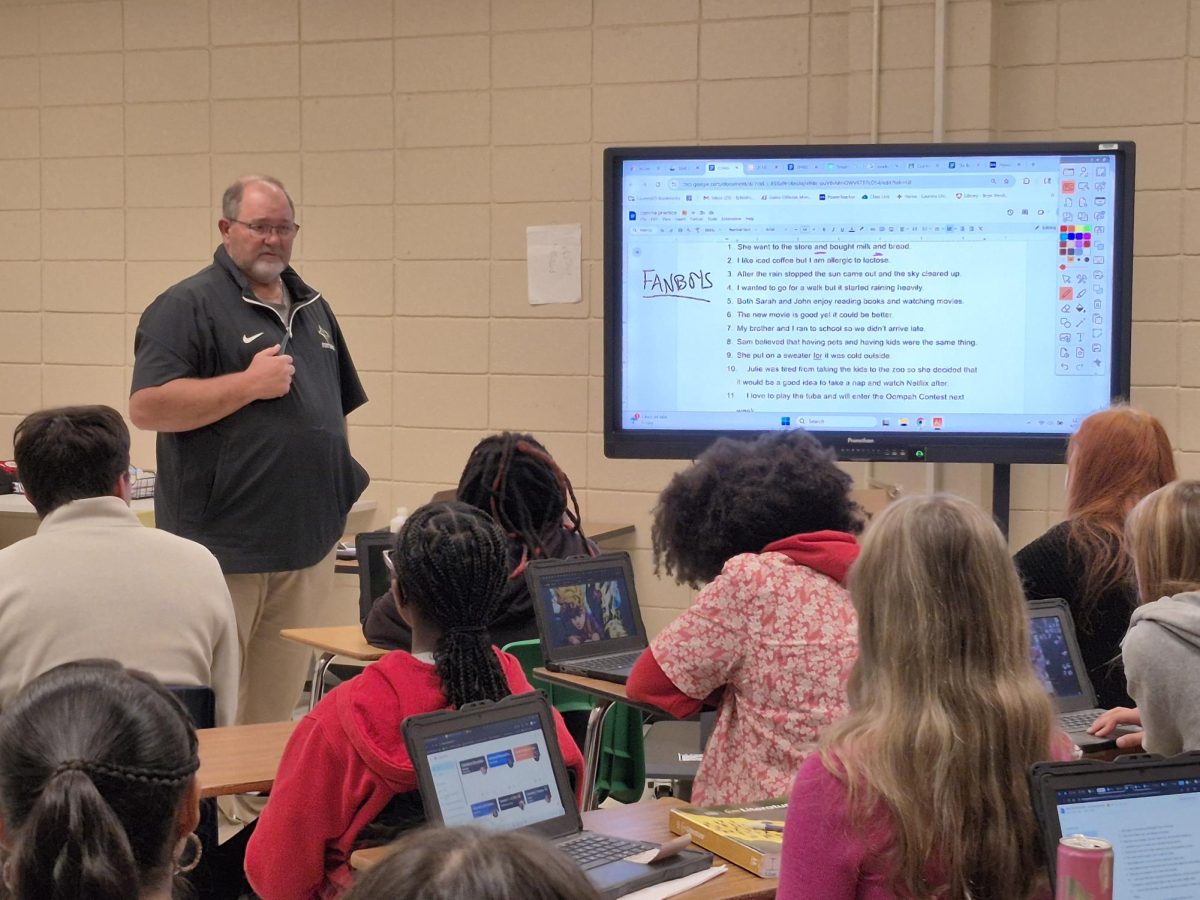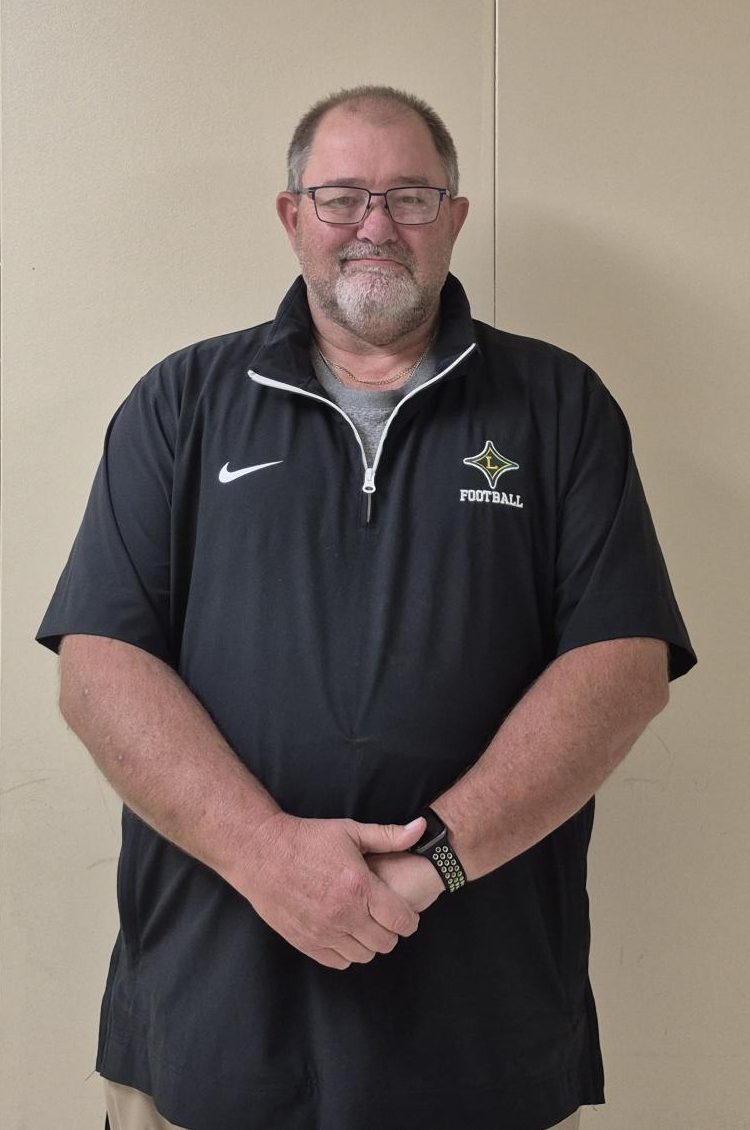
Ellie Lewis
English teacher Jamie Childress teaches his English 3 Honors class grammar rules.
The hum of the air conditioner fills the beige-walled classroom, the fluorescent lights casting a steady but imperfect glow on the rearranged rows of desks. From the Commons outside comes the low murmur of student voices, but inside, the space feels calm and familiar. It is settings like this—amid the buzz of cooling vents—where former baseball and football coach Jamie Childress has spent decades teaching literature while also shaping athletes on the field. For more than 20 years, Childress balanced the worlds of English essays and sports playbooks, guiding students not only through Faulkner but also through Friday Night Lights.
“Football and baseball were my two things in school. Baseball was my first love, obviously. I coached baseball for 20 something years as well until my son graduated from high school,” Childress said, his voice always just loud enough to be heard when he spoke–always clear and concise.
Childress never planned to be a teacher. He originally wanted to attend medical school. He was playing baseball at the time, which affected which major he chose. He did not want to be a science major because that meant he would be stuck in labs all afternoon. That would conflict with his baseball practice. So, instead he chose to be a math major, which would allow him time to continue his athletic career.
However, Childress’ math teacher was not helping him. He was struggling heavily with the class. Under the guise that he would still be attending medical school, he chose to switch his major to English–the only major he could switch to and still graduate on time with. He later decided to switch over to education, and his degree just so happened to be in English.
“After my junior year, I realized that if I went to med school, I would never be around sports again,” Childress said. “I would never be involved in athletics, ’cause I would be in a hospital all the time. And I wasn’t ready for that. I wanted to be around athletics–baseball in particular at the time–and I just wasn’t ready to get rid of them.”
Sports had always been a big part of Childress’ life, as he grew up and continuing well into his adulthood.
After he graduated, he became assistant coach for the baseball team at Presbyterian College for three years. While working there, he built a very close relationship with the coach.
“Matter of fact, my coach at Presbyterian is now the head coach at Vanderbilt. We still have a great relationship, I could call him right now, and he would get me anything I need. If I needed something, he would get it to me,” Childress said. “Matter of fact, when I was sick and my spleen was messed up, he said, ‘Do I need to get you up here at Vanderbilt and have them look at you?’ That’s how close we still are. So I did that for three years, and then he moved on to a bigger job, and there wasn’t room for me, so that’s when I got into the high school setting.”
As he moved to teaching at high schools, he worked at McCormick High School–a far smaller school than LDHS.
“Here we have 12-13 football coaches; there we had six. So if you were to coach there, you have to do more than one sport,” Childress said. “And so I was always very athletic growing up; I played in high school: football, basketball, baseball. I was a three sport letterman here at Laurens. So it was a no-brainer to coach more than one sport and–to be honest–you make a whole lot more money coaching football then you do baseball.”
Childress continued to coach baseball up until his son graduated from high school. He stopped coaching baseball so he could go watch his son play in college. Following the years after his son’s graduation, Childress only coached football. For him, coaching was another form of teaching.
“It’s teaching in a different classroom. You do the same things out there that you do in here. You teach the game of football, but you’re also teaching life lessons,” Childress said.
Childress sees the importance of showing kids connections between what they are taught and the world. He wants to leave the kids with something more than just the plays of the game and the words on the page.
“I try to incorporate life lessons in the class as well because it’s not just about the words on the page–it’s life lessons,” Childress said.
As his boys grew up, Childress did not get to spend as much time with them as he would have liked. Between being a teacher and coaching, he had very little free time. His late wife was spending more time raising and caring for the kids than he was because of how busy he was with coaching.
“Luckily, both of my kids played baseball, and both of them played some football, so during those seasons I would get to spend more time with them. But with their younger years, she would be the one to take them to practices and do a lot of things with them. I missed a lot of them growing up,” Childress said.
Childress cares very much about his family; a good way to distract him during class is to ask him about his granddaughters. Earlier this year, he got engaged. After the wedding, he and his fiancée plan to move to Greenwood, which will result in a rather long commute to LDHS. His upcoming marriage and move is another reason he is choosing not to coach this year, so he can spend more time with his family.
“The hardest thing about being a teacher and a coach is the time away from your family,” Childress said.
Managing his time while teaching during the day and coaching in the afternoon can be tricky. He does not have much time to grade, because during his fourth block planning, he goes to help teach a football class. If the grades are not done in class, it could be a while before they are done. Compared to college coaching, his life as a high school coach is very different.
“If I were in college, I wouldn’t be in the classroom at all. It would just be coaching baseball 24/7. You would be recruiting; you practice in the fall; you practice in the spring,” he said.
Childress had always loved sports; it is no wonder they played a big part in his life. From balancing his teaching career while coaching, to managing time to still see his family, sports have touched so many aspects of his life. He has learned to manage that all over his years of teaching and coaching. Through the life lessons he gives his students and players, he shows how they can balance everything in their lives.
From teaching life lessons in the classroom to on the field, he really sets an example for how a teacher can guide people.
“To be a good football coach, you’ve gotta be a good teacher. So if you’re not a good teacher in the classroom, you won’t be a good coach on the field,” Childress said.

